
Journal Menu
► ▼ Journal Menu-
- Energies Home
- Aims & Scope
- Editorial Board
- Reviewer Board
- Topical Advisory Panel
- Instructions for Authors
- Special Issues
- Topics
- Sections & Collections
- Article Processing Charge
- Indexing & Archiving
- Editor’s Choice Articles
- Most Cited & Viewed
- Journal Statistics
- Journal History
- Journal Awards
- Society Collaborations
- Conferences
- Editorial Office
Journal Browser
► ▼ Journal BrowserNeed Help?
Announcements
27 May 2025
Energies | Highly Cited Papers in 2024 in the Section “Electrical Engineering”
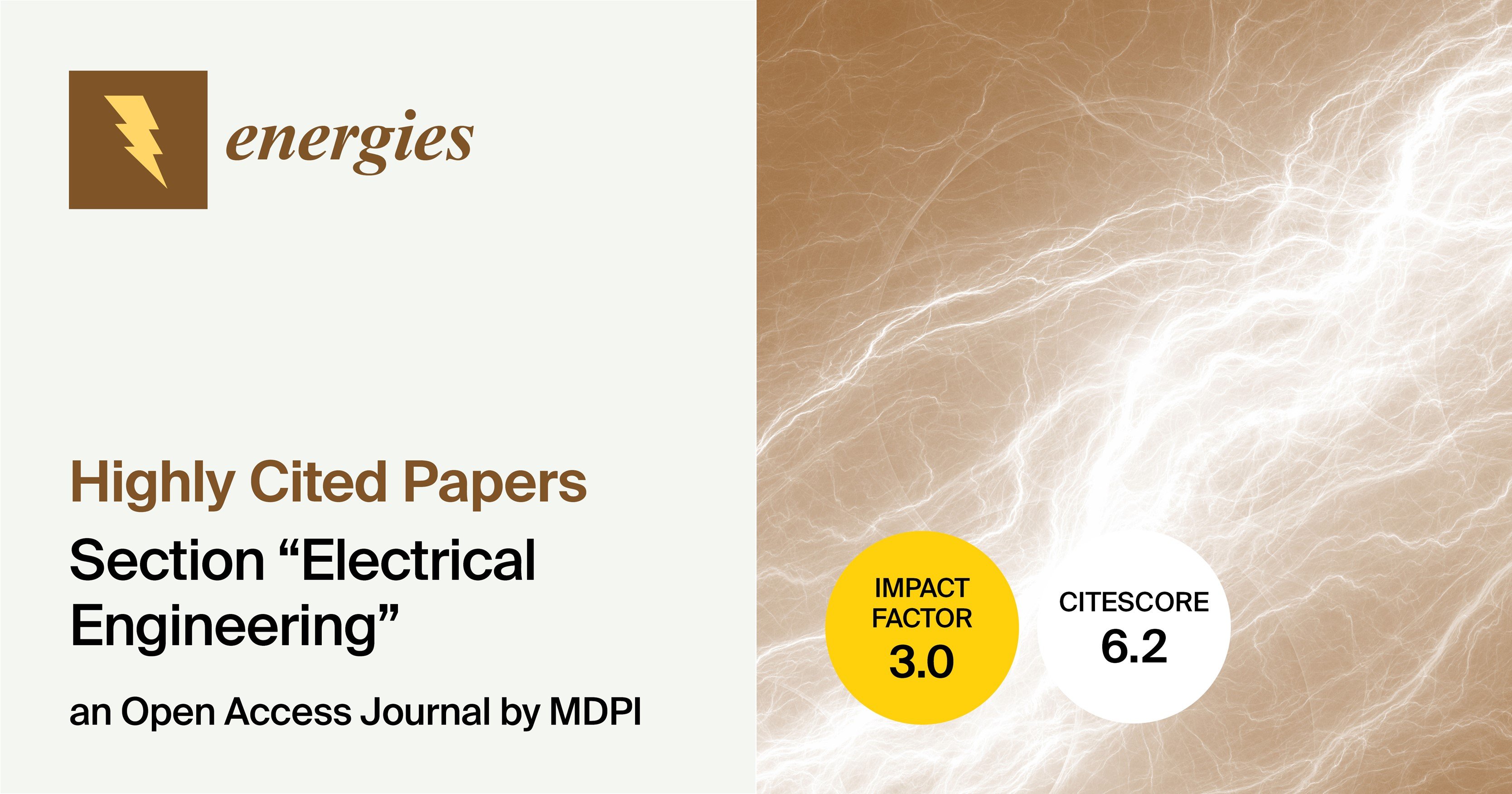
1. “BLDC Motor Speed Control with Digital Adaptive PID-Fuzzy Controller and Reduced Harmonic Content”
by Kaspars Kroičs and Arvīds Būmanis
Energies 2024, 17(6), 1311; https://doi.org/10.3390/en17061311
Available online: https://www.mdpi.com/1996-1073/17/6/1311
2. “A Review on the Classification of Partial Discharges in Medium-Voltage Cables: Detection, Feature Extraction, Artificial Intelligence-Based Classification, and Optimization Techniques”
by Haresh Kumar, Muhammad Shafiq, Kimmo Kauhaniemi and Mohammed Elmusrati
Energies 2024, 17(5), 1142; https://doi.org/10.3390/en17051142
Available online: https://www.mdpi.com/1996-1073/17/5/1142
3. “Multiple Factors Coupling Probability Calculation Model of Transmission Line Ice-Shedding”
by Hao Pan, Fangrong Zhou, Yi Ma, Yutang Ma, Ping Qiu and Jun Guo
Energies 2024, 17(5), 1208; https://doi.org/10.3390/en17051208
Available online: https://www.mdpi.com/1996-1073/17/5/1208
4. “An Analysis of Risks and Challenges to the Polish Power Industry in the Year 2024”
by Stanisław Tokarski, Małgorzata Magdziarczyk and Adam Smoliński
Energies 2024, 17(5), 1044; https://doi.org/10.3390/en17051044
Available online: https://www.mdpi.com/1996-1073/17/5/1044
5. “Overview on Permanent Magnet Motor Trends and Developments”
by Vasileios I. Vlachou, Georgios K. Sakkas, Fotios P. Xintaropoulos, Maria Sofia C. Pechlivanidou, Themistoklis D. Kefalas, Marina A. Tsili and Antonios G. Kladas
Energies 2024, 17(2), 538; https://doi.org/10.3390/en17020538
Available online: https://www.mdpi.com/1996-1073/17/2/538
6. “Research on Multi-Objective Optimization of High-Speed Solenoid Valve Drive Strategies under the Synergistic Effect of Dynamic Response and Energy Loss”
by Zhiqing Yu, Li Yang, Jianhui Zhao and Leonid Grekhov
Energies 2024, 17(2), 300; https://doi.org/10.3390/en17020300
Available online: https://www.mdpi.com/1996-1073/17/2/300
7. “Data-Driven Techniques for Short-Term Electricity Price Forecasting through Novel Deep Learning Approaches with Attention Mechanisms”
by Vasileios Laitsos, Georgios Vontzos, Dimitrios Bargiotas, Aspassia Daskalopulu and Lefteri H. Tsoukalas
Energies 2024, 17(7), 1625; https://doi.org/10.3390/en17071625
Available online: https://www.mdpi.com/1996-1073/17/7/1625
8. “A Multi-Source Power System’s Load Frequency Control Utilizing Particle Swarm Optimization”
by Zhengwei Qu, Waqar Younis, Yunjing Wang and Popov Maxim Georgievitch
Energies 2024, 17(2), 517; https://doi.org/10.3390/en17020517
Available online: https://www.mdpi.com/1996-1073/17/2/517
9. “Efficiency Improvement of Permanent Magnet Synchronous Motors Using Model Predictive Control Considering Core Loss”
by Lian Hou, Youguang Guo, Xin Ba, Gang Lei and Jianguo Zhu
Energies 2024, 17(4), 773; https://doi.org/10.3390/en17040773
Available online: https://www.mdpi.com/1996-1073/17/4/773
10. “Particle Swarm-Optimized Fuzzy Logic Energy Management of Hybrid Energy Storage in Electric Vehicles”
by Joseph Omakor, Mohamad Alzayed and Hicham Chaoui
Energies 2024, 17(9), 2163; https://doi.org/10.3390/en17092163
Available online: https://www.mdpi.com/1996-1073/17/9/2163
27 May 2025
Energies Exceptional Reviewers List 2025
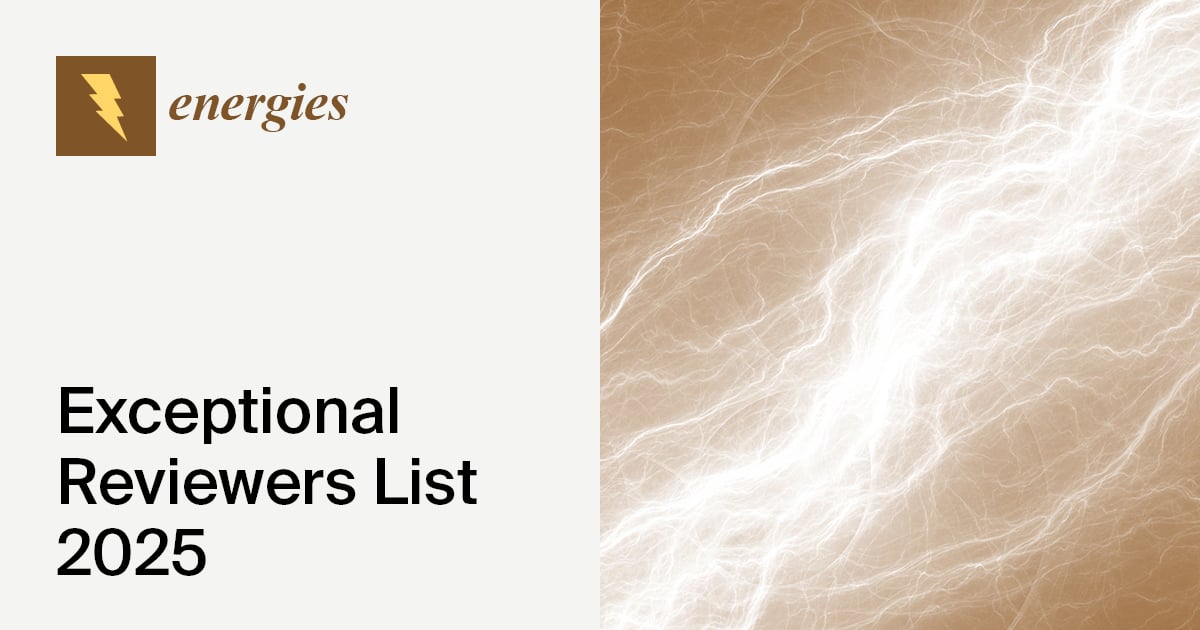
We are thrilled to share the updated Exceptional Reviewers List for 2025. This program was designed to recognize and honor scholars who have delivered consistently exceptional review reports to our journal. Committed to fostering rigorous research and promoting knowledge exchange, Energies (ISSN: 1996-1073) recognizes the significant role our reviewers play in maintaining the quality and integrity of the articles we publish. According to surveys conducted in 2024, 92% of our authors rate the peer-review process as being good or excellent, thanks to our pool of excellent reviewers.
We would like to express our sincere appreciation to all the reviewers who have generously volunteered their time and expertise to assist in Energies’ peer-review process. Their dedication and attention to detail in evaluating manuscripts, offering valuable feedback, and contributing to academic rigor are truly commendable.
The Exceptional Reviewers List was introduced in March 2024. Each quarter, we will be selecting a group of outstanding reviewers and will introduce them here.
Q1
Name: Dr. Cristian Paul Chioncel
Affiliation: Department of Engineering Science, Babeș-Bolyai University, 400347 Cluj Napoca, Romania
Name: Dr. Yinxiao Zhu
Affiliation: College of Electrical Engineering, Zhejiang University, Hangzhou 310027, China
Name: Dr. Zdenek Slanina
Affiliation: Faculty of Electrical Engineering and Computer Science, VSB–Technical University of Ostrava, 708 00 Ostrava, Czech Republic
Name: Prof. Dr. Erick Jones Jr.
Affiliation: Department of Industrial, Manufacturing, and Systems Engineering, University of Texas at Arlington, Woolf Hall Room 420X, 500 West 1st St, Arlington, TX 76019, USA
Name: Prof. Dr. Charles Yousif
Affiliation: Institute for Sustainable Energy, University of Malta, Barrakki Street, MXK 1531 Marsaxlokk, Malta
“Being a reviewer has enriched my academic journey, and with the MDPI team’s logistical and professional support, I could focus on my evaluations to ensure high-quality publications.”
Q2
Name: Dr. Denis Stanescu
Affiliation: Telecommunications and Information Technology Department, Military Technical Academy “Ferdinand I”, 050141 Bucharest, Romania
Name: Dr. Mostafa H. Elsharqawy
Affiliation: School of Engineering, College of Engineering and Physical Sciences, University of Guelph, Guelph, ON N1G 2W1, Canada
Name: Dr. Petru Notingher
Affiliation: Faculty of Electrical Engineering, Electrotechnical, Material Laboratory, University Politehnica of Bucharest, Splaiul Independentei 313, 060042 Bucharest, Romania
Name: Dr. Federico Minelli
Affiliation: Department of Industrial Engineering, University of Naples Federico II, Piazzale V. Tecchio, 80, 80125 Naples, Italy
Interview: “Reviewing is compass work—aligning studies to north stars of rigor, transparency, and quality. I treat each review as collaboration in disguise—firm on method, warm in tone, faithful to the science.”
Name: Dr. Navid Bayati
Affiliation: Center for Industrial Electronics, Institute of Mechanical and Electrical Engineering, University of Southern Denmark, 6400 Sønderborg, Denmark
23 May 2025
MDPI at EGU 2025: Celebrating Open Science and Academic Excellence
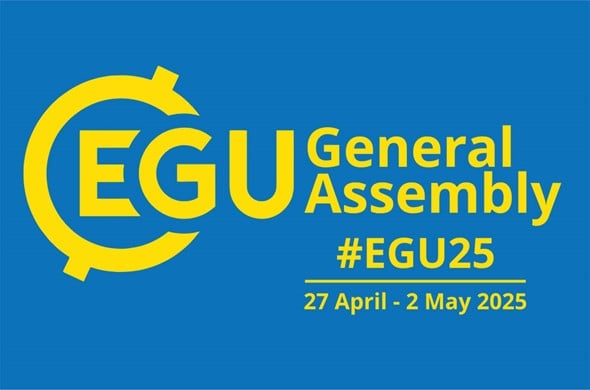
From 27 April to 2 May 2025, MDPI joined the European Geosciences Union (EGU) General Assembly in Vienna, Austria, welcoming over 20,984 attendees from 120+ countries at booth 02 in the Entrance Hall. This landmark event featured 18,934 presentations across 1,102 sessions, with 56% of abstracts contributed by Early Career Scientists (ECSs)—a testament to the vibrant future of geosciences.
Academic Engagement: Dialogue and Collaboration
Meet the Editors-in-Chief
We hosted two insightful sessions with editorial leaders from top journals:
- April 28: Prof. Dr. Stephen Macko (Editor-in-Chief of Nitrogen) and Prof. Dr. Zhong Lu (Editor-in-Chief of GeoHazards);
- April 29: Dr. Tommaso Caloiero (Section Editor-in-Chief of Hydrology) and Prof. Dr. Rui A. P. Perdigão (Section Editor-in-Chief of Climate).
These discussions fostered meaningful connections between attendees and editors, strengthening our commitment to supporting scholarly exchange.
 |
 |
Environmental and Earth Sciences Journals Editorial Board Meeting

Leaders from MDPI’s environmental and earth sciences journals convened for an in-person meeting to discuss journal updates, peer review enhancements, and editorial standards. The dialogue emphasized collaboration to maintain our rigorous publishing quality.
Award Ceremonies: Honoring Innovation
Remote Sensing Travel Award
On April 30, Dr. Nicola Nocentini (University of Padua and University of Florence) received the award from Associate Editor Prof. Dr. Fabio Tosti. Following the ceremony, Dr. Nocentini shared insights into an exclusive booth interview.
 |
 |
Geosciences Best Paper Award
Prof. Dr. Olivier Lacombe (Section Editor-in-Chief of Geosciences) presented the award for the paper “Improving the Estimation of the Occurrence Time of an Impending Major Earthquake Using the Entropy Change of Seismicity in Natural Time Analysis”—a groundbreaking study on earthquake prediction.

Interactive Highlights: Fun and Engagement
Raffle Games
Attendees enjoyed lively prize draws, with customized gifts adding a playful touch to scientific networking.
 |
 |
Quick Q&A Sessions
Topic-based quizzes sparked friendly competition, turning academic curiosity into interactive fun—even hesitant scholars joined the excitement!
 |
 |
Looking Ahead: Advancing Open Science
Participating in the EGU General Assembly constituted a profoundly enriching experience. Through this engagement, we engaged in profound dialogues not only with authors, reviewers, and members of the Editorial Boards associated with MDPI, but also were afforded the invaluable opportunity to disseminate our institutional mission to emerging scholars.
As an entity steadfastly committed to fostering open scientific exchange across all academic disciplines, MDPI reaffirms its unwavering dedication to advancing global scholarship. We earnestly look forward to prospects of connecting with researchers from around the world, collaborating in unison to expand the frontiers of knowledge and advocate for the practices of open science.
22 May 2025
Energies Webinar | Innovations in Thermal Energy Processes and Management, 6 June 2025
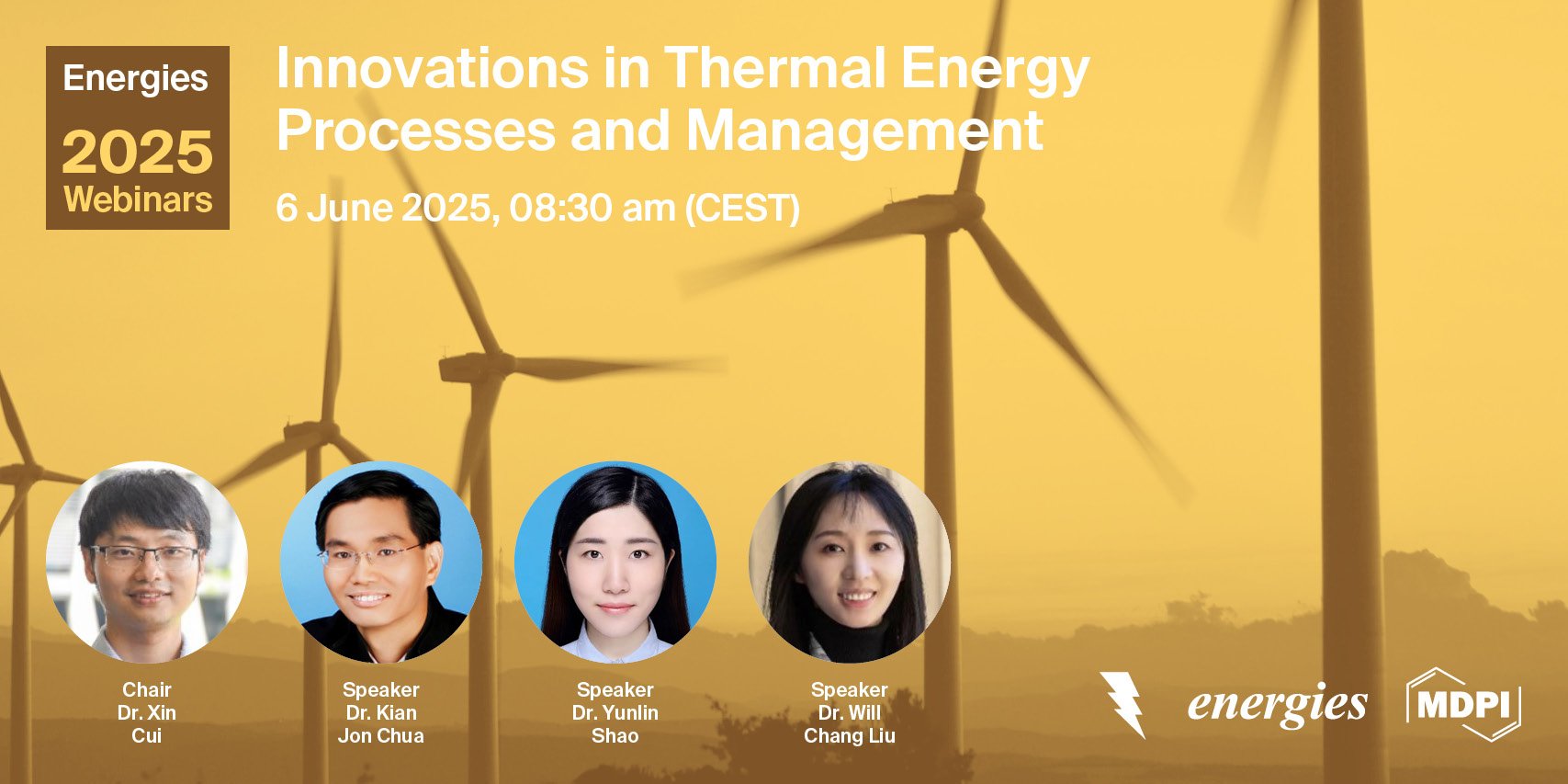
As the global push for sustainable energy intensifies, thermal energy systems are undergoing a transformative shift. This webinar presents recent innovations in thermal energy processes and management, with a spotlight on emerging solutions in battery thermal management, high-efficiency heat exchangers, and AI-enabled control strategies.
This webinar explores how advances in materials, system integration, and smart control are improving the thermal performance of next-generation technologies. Particular emphasis is placed on thermal challenges in battery safety, lifespan, and rapid charging, as well as how novel cooling architectures and phase-change materials are addressing them.
By reinventing how heat is managed, stored, and utilized, these innovations support greater energy efficiency, system reliability, and progress toward net-zero goals.
Date: 6 June 2025 at 8:30 a.m. CEST | 2:30 a.m. EDT | 2:30 p.m. CST Asia
Webinar ID: 872 4117 0552
Register now for free!
| Speaker/Presentation | Time in CEST | Time in CST Asia |
| Dr. Xin Cui Chair Introduction |
8:30–8:40 a.m. | 2:30–2:40 p.m. |
| Dr. Kian Jon Chua Smart Heat - Innovations in Thermal Energy Recovery and Utilization |
8:40–9:00 a.m. | 2:40–3:00 p.m. |
| Dr. Yunlin Shao A Thermally Induced Flexible Composite Phase Change Material for Battery Thermal Management |
9:00–9:20 a.m. | 3:00–3:20 p.m. |
| Dr. Will Chang Liu Broadband Thermal Management Using Thermo-Responsive Polymer Composite Films |
9:20–9:40 a.m. | 3:20–3:40 p.m. |
| Q&A Session | 9:40–9:55 a.m. | 3:40–3:55 p.m. |
| Dr. Xin Cui Closing of Webinar |
9:55–10:00 a.m. | 3:55–4:00 p.m. |
After registering, you will receive a confirmation email containing information on how to join the webinar. Registrations with academic institutional email addresses will be prioritized.
Unable to attend? Register anyway and we will inform you when the recording is available.
Webinar Chair and Keynote Speakers:
- Dr. Xin Cui (Chair), School of Human Settlements and Civil Engineering, Xi’an Jiaotong University, Xi’an, China;
- Dr. Kian Jon Chua, Department of Mechanical Engineering, National University of Singapore, Singapore;
- Dr. Yunlin Shao, School of Energy and Power Engineering, Chongqing University, Chongqing, China;
- Dr. Will Chang Liu, Department of Mechanical Engineering, National University of Singapore, Singapore.
“Innovations in Thermal Energy Processes and Management”
Guest Editors: Dr. Xin Cui and Dr. Yunlin Shao
Deadline for manuscript submissions: 10 November 2025
21 May 2025
Meet Us at the China Materials Conference 2025, 5–8 July 2025, Xiamen, China
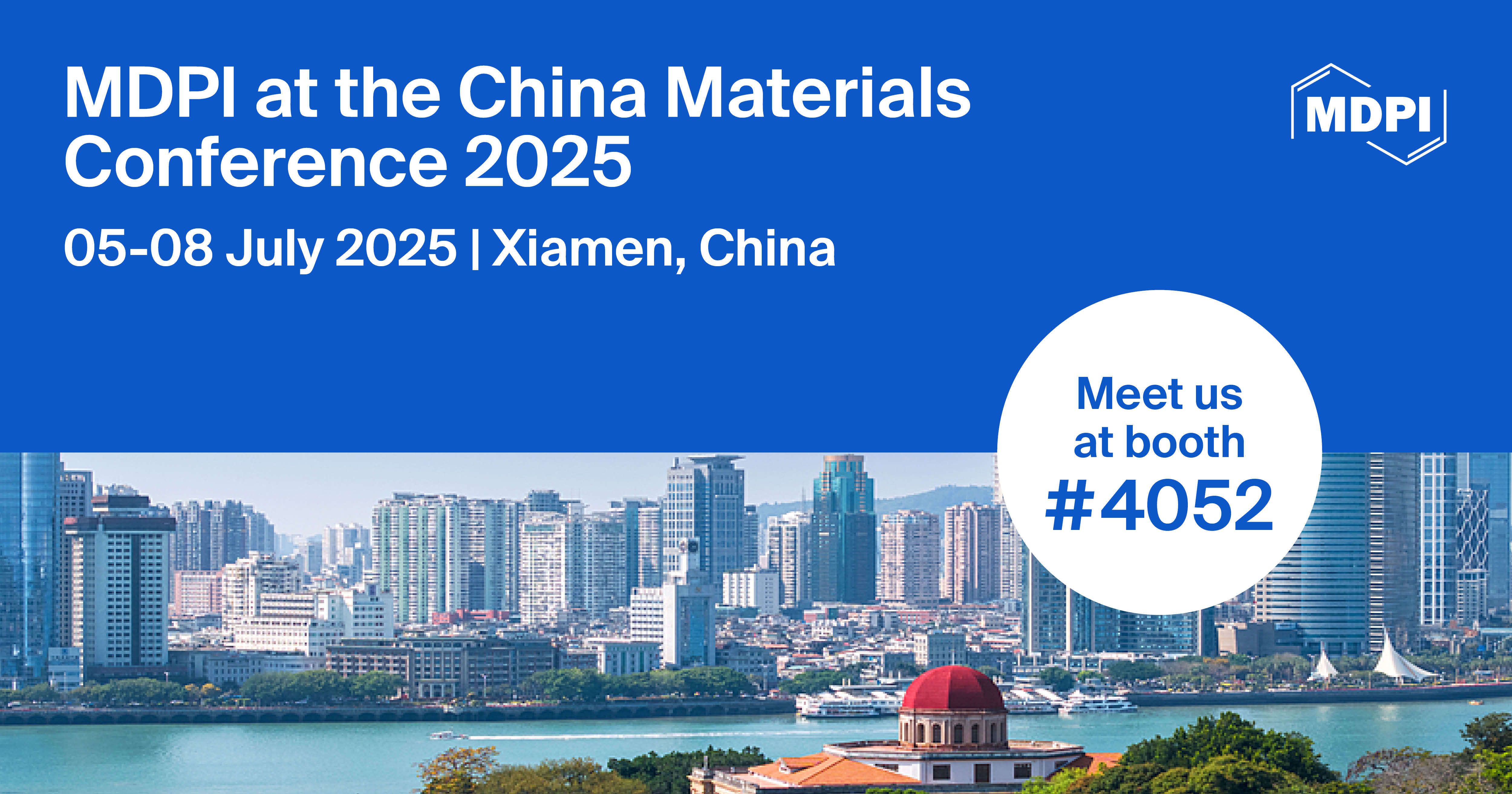
The China Materials Conference 2025 will be held from 5 to 8 July 2025, in Xiamen, China. The conference is organized by the China Materials Society.
Areas include the following:
- Energy materials;
- Environmental materials;
- Advanced structural materials;
- Functional materials;
- Material design, preparation and evaluation.
The following MDPI journals will be represented:
If you are attending this conference, please feel free to initiate an online conversation with us. Our delegates look forward to meeting you in person at booth #4052 and answering any questions that you may have. For more information about the conference, please visit the following link: https://cmc2025.scimeeting.cn/.
20 May 2025
Energies Webinar | Green Energy Application with Fluidization Conversion Technology, 23 May 2025
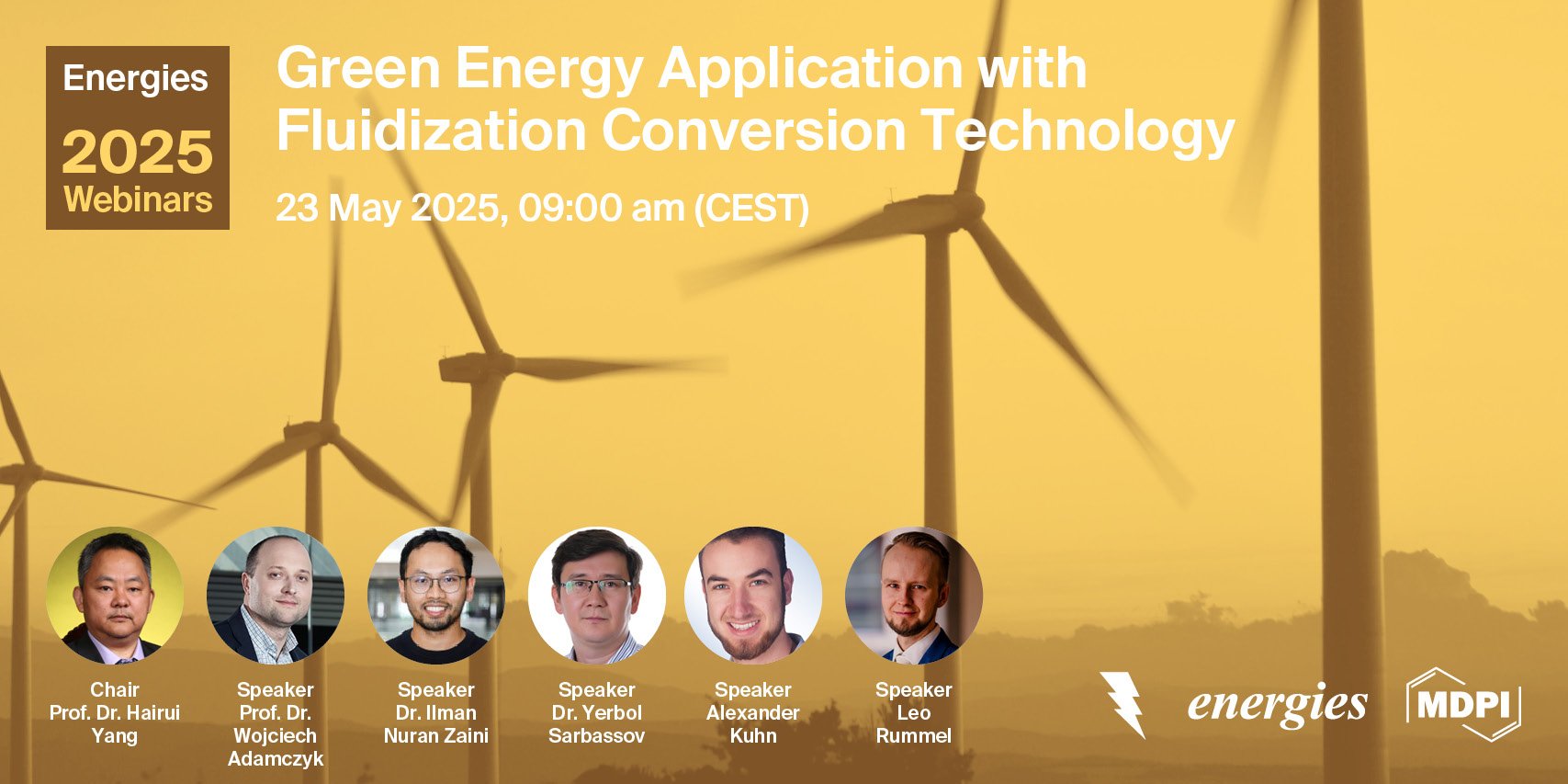
Join us for an exciting online seminar exploring cutting-edge innovations in green energy and fluidization conversion technology! This webinar brings together internationally renowned young scholars at the forefront of sustainable energy research.
Date: 23 May 2025 | 9:00 a.m. CEST | 3:00 p.m. CST Asia | 5:00 p.m. AEST
Webinar ID: 833 2054 1716
Website: https://sciforum.net/event/Energies-13
Key Topics: Fluidized bed reactors, biomass conversion, carbon capture, and green energy.
Guest Speakers: Rising stars from leading universities and research institutions worldwide.
Interactive Sessions: Live Q&A to discuss challenges and future directions in fluidization technology.
Keywords: fluidized bed reactors; carbon capture; green energy; biomass conversion
Register now for free!
Program:
| Speaker / Presentation | Time in CEST | Time in CST Asia |
| Prof. Dr. Hairui Yang Chair Introduction | 9:00–9:10 a.m. | 3:00–3:10 p.m. |
| Prof. Dr. Wojciech Adamczyk Demonstration of Numerical Algorithms to Improve Functionality of a Large-Scale CFB Unit Based on Digital Twin Approach | 9:10–9:30 a.m. | 3:10–3:30 p.m. |
| Dr. Ilman Nuran Zaini Toward Fossil-Free Steel: Assessing the Role of Biomass Gasification | 9:30–9:50 a.m. | 3:30–3:50 p.m. |
| Dr. Yerbol Sarbassov Air and Steam Gasification of Sewage Sludge Waste in the Small-Scale Bubbling Fluidized Bed | 9:50–10:10 a.m. | 3:50–4:10 p.m. |
| Mr. Alexander Kuhn CFB Boiler Decarbonization: Waste Fuel Integration and CO₂ Capture Solutions | 10:10–10:30 a.m. | 4:10–4:30 p.m. |
| Mr. Leo Rummel CFB Boiler Performance Under Transient Conditions | 10:30–10:50 a.m. | 4:30–4:50 p.m. |
After registering, you will receive a confirmation email on how to join the webinar. Registrations with academic institutional email addresses will be prioritized.
Unable to attend? Register anyway, and we will inform you when the recording is available for viewing.
Webinar Chair and Keynote Speakers:
- Prof. Dr. Hairui Yang, Department of Energy and Power Engineering, Tsinghua University, China;
- Prof. Dr. Wojciech Adamczyk, Department of Thermal Technology, Silesian University of Technology, Poland;
- Dr. Ilman Nuran Zaini, Faculty of Mechanical and Aerospace Engineering, Institut Teknologi Bandung (ITB), Indonesia;
- Dr. Yerbol Sarbassov, Mechanical and Aerospace Engineering Department, School of Engineering and Digital Sciences, Nazarbayev University, Kazakhstan;
- Mr. Alexander Kuhn, Institute for Energy Systems & Technology, Technical University of Darmstadt, Germany;
- Mr. Leo Rummel, Department of Energy Technology, Tallinn University of Technology, Estonia.
14 May 2025
International Day of Light—“Light, Innovation, Society”, 16 May 2025
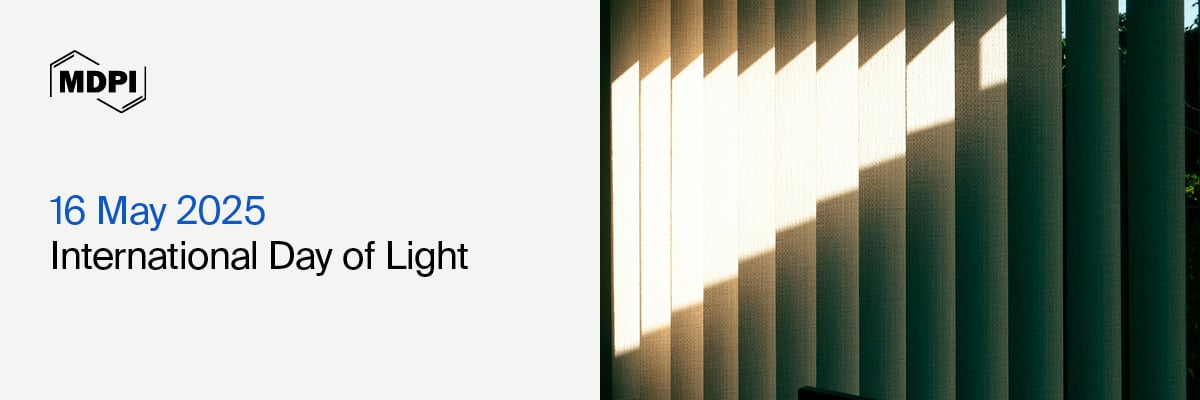
Celebrating the International Day of Light, we reflect on light’s essential role in connecting scientific discovery with daily life. Guided by the 2025 theme, “Light, Innovation, Society”, we explore how light transcends boundaries—driving innovations across disciplines, enhancing human experiences, and fostering collaborative solutions to shared challenges. As both a universal symbol and a scientific tool, light continues to inspire curiosity, creativity, and meaningful connections in an ever-evolving world.
MDPI invites researchers and readers to engage with our open access journals, Special Issues, and collaborative platforms dedicated to advancing light-related research. Discover freely accessible studies spanning from foundational principles to emerging applications, participate in global discussions through interdisciplinary forums, and contribute to open science efforts that bridge ideas and communities. Together, let us harness light’s simplicity and depth to spark dialogue, empower collective progress, and illuminate pathways toward a brighter, more inclusive future.

 |
 |
 |
 |
 |
 |
 |
 |
 |
 |
 |
 |

“Preparation and Photoelectric Properties of Nanostructured Native Oxide of Gallium Monoselenide with Applications in Gas Sensors”
by Veaceslav Sprincean, Alexandru Macovei, Liviu Leontie, Aurelian Carlescu, Silviu Gurlui and Mihail Caraman
J. Compos. Sci. 2025, 9(4), 194; https://doi.org/10.3390/jcs9040194
“Optical Forces on Chiral Particles: Science and Applications”
by Weicheng Yi, Haiyang Huang, Chengxing Lai, Tao He, Zhanshan Wang, Xinhua Dai, Yuzhi Shi and Xinbin Cheng
Micromachines 2024, 15(10), 1267; https://doi.org/10.3390/mi15101267
“Innovative Integration of Dual Quantum Cascade Lasers on Silicon Photonics Platform”
by Dongbo Wang, Harindra Kumar Kannojia, Pierre Jouy, Etienne Giraud, Kaspar Suter, Richard Maulini, David Gachet, Léo Hetier, Geert Van Steenberge and Bart Kuyken
Micromachines 2024, 15(8), 1055; https://doi.org/10.3390/mi15081055
“Extremely Weak Electro-Optic Kerr Effect in Methyl Silicone Oils”
by Marek Izdebski, Rafał Ledzion and Szymon Węgrzynowski
Materials 2024, 17(8), 1850; https://doi.org/10.3390/ma17081850
“Estimating Compressive and Shear Forces at L5-S1: Exploring the Effects of Load Weight, Asymmetry, and Height Using Optical and Inertial Motion Capture Systems”
by Iván Nail-Ulloa, Michael Zabala, Richard Sesek, Howard Chen, Mark C. Schall, Jr. and Sean Gallagher
Sensors 2024, 24(6), 1941; https://doi.org/10.3390/s24061941
“A Review of Solar Forecasting Techniques and the Role of Artificial Intelligence”
by Khadija Barhmi, Chris Heynen, Sara Golroodbari and Wilfried van Sark
Solar 2024, 4(1), 99-135; https://doi.org/10.3390/solar4010005
“Pulp Particle Classification Based on Optical Fiber Analysis and Machine Learning Techniques”
by Stefan B. Lindström, Rabab Amjad, Elin Gåhlin, Linn Andersson, Marcus Kaarto, Kateryna Liubytska, Johan Persson, Jan-Erik Berg, Birgitta A. Engberg and Fritjof Nilsson
Fibers 2024, 12(1), 2; https://doi.org/10.3390/fib12010002
“A Review of State-of-the-Art and Short-Term Forecasting Models for Solar PV Power Generation”
by Wen-Chang Tsai, Chia-Sheng Tu, Chih-Ming Hong and Whei-Min Lin
Energies 2023, 16(14), 5436; https://doi.org/10.3390/en16145436
“Long-Cavity M-Plane GaN-Based Vertical-Cavity Surface-Emitting Lasers with a Topside Monolithic Curved Mirror”
by Nathan C. Palmquist, Ryan Anderson, Jared A. Kearns, Joonho Back, Emily Trageser, Stephen Gee, Steven P. Denbaars and Shuji Nakamura
Photonics 2023, 10(6), 646; https://doi.org/10.3390/photonics10060646
“Direct Fabrication of Ultrahydrophobic Laser-Induced Graphene for Strain Sensors”
by Devanarayanan Meena Narayana Menon, Matteo Giardino and Davide Janner
Appl. Sci. 2023, 13(8), 4935; https://doi.org/10.3390/app13084935
“Photonic Crystals Fabricated by Two-Photon Polymerization with Mechanical Defects”
by Victoria Paige Stinson, Nuren Shuchi, Dustin Louisos, Micheal McLamb, Glenn D. Boreman and Tino Hofmann
Optics 2023, 4(2), 300-309; https://doi.org/10.3390/opt4020021
“Beyond Conventional Sensing: Hybrid Plasmonic Metasurfaces and Bound States in the Continuum”
by Dominic Bosomtwi and Viktoriia E. Babicheva
Nanomaterials 2023, 13(7), 1261; https://doi.org/10.3390/nano13071261

|
“Novel Approaches for High Speed Optical Communication” |
“New Prospects in Fiber Optic Sensors and Applications” |
 |
 |
|
“Photonic Integrated Circuits for Information, Computing and Sensing” |
“Microrheology with Optical Tweezers” |
 |
 |
|
“Optical Composites, Nanophotonics and Metamaterials” |
“Recent Trends in Light-Assisted Reactions for CO2 Conversion to Fuels and Chemicals” |
 |
 |

 |
 |
 |
 |
13 May 2025
Empowering Academic Growth with MDPI: A Scientific Publishing Exchange at Toronto Metropolitan University, 15 May 2025
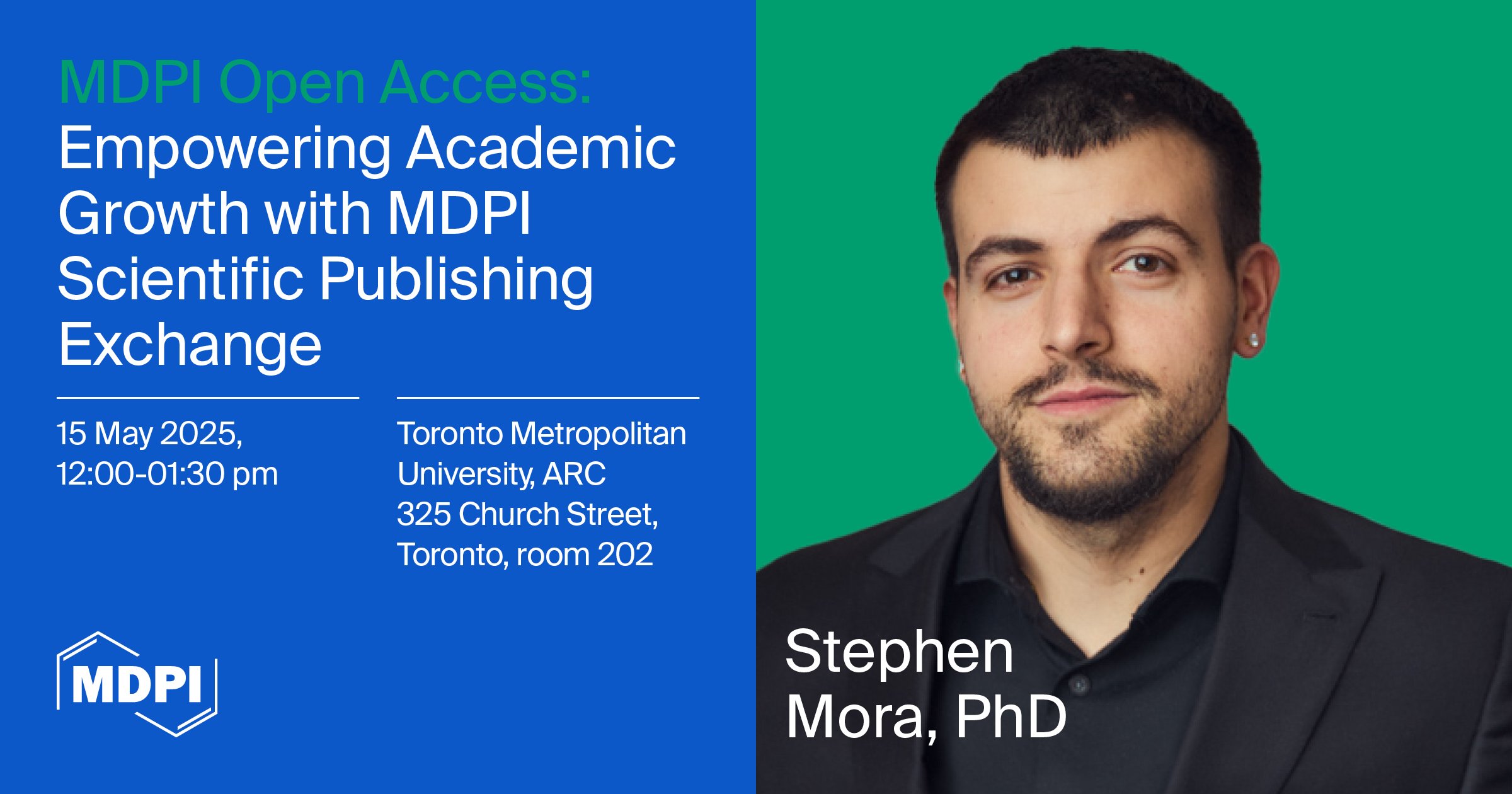
MDPI is excited to collaborate with Toronto Metropolitan University to host an engaging Scientific Publishing Workshop aimed at empowering scholars with the knowledge and tools needed to succeed in academic publishing. This workshop will delve into the key aspects of MDPI’s open access publishing framework, offering an in-depth exploration of journal selection, the editorial workflow, and the essentials of publication ethics. Participants will also gain practical advice on improving their scientific writing and effectively addressing reviewer comments, with guidance from an experienced professional. This session promises to equip attendees with valuable skills to elevate their publishing journey.
Workshop Highlights:
- Learn How to Better Write and Structure a Research Article;
- How to Choose Where to Publish Academic Work;
- How to Respond to Reviewer Comments;
- Reasons for Rejection During Pre-Check;
- How to Navigate Through Ethics and AI Use.
Date: 15 May 2025
Time: 12:00–1:30 p.m.
Venue: Toronto Metropolitan University
Program:
|
Speakers |
Program and Content |
Time |
|
Dr. Stephen Mora |
Introduction to MDPI |
12:00–12:05 p.m. |
|
|
How to Write and Structure a Research Article |
12:05–12:45 p.m. |
|
|
How to Respond to Reviewer Comments |
12:45–1:30 p.m. |

13 May 2025
Energies | Highly Cited Papers in 2024 in the Section “Energy Storage and Application”
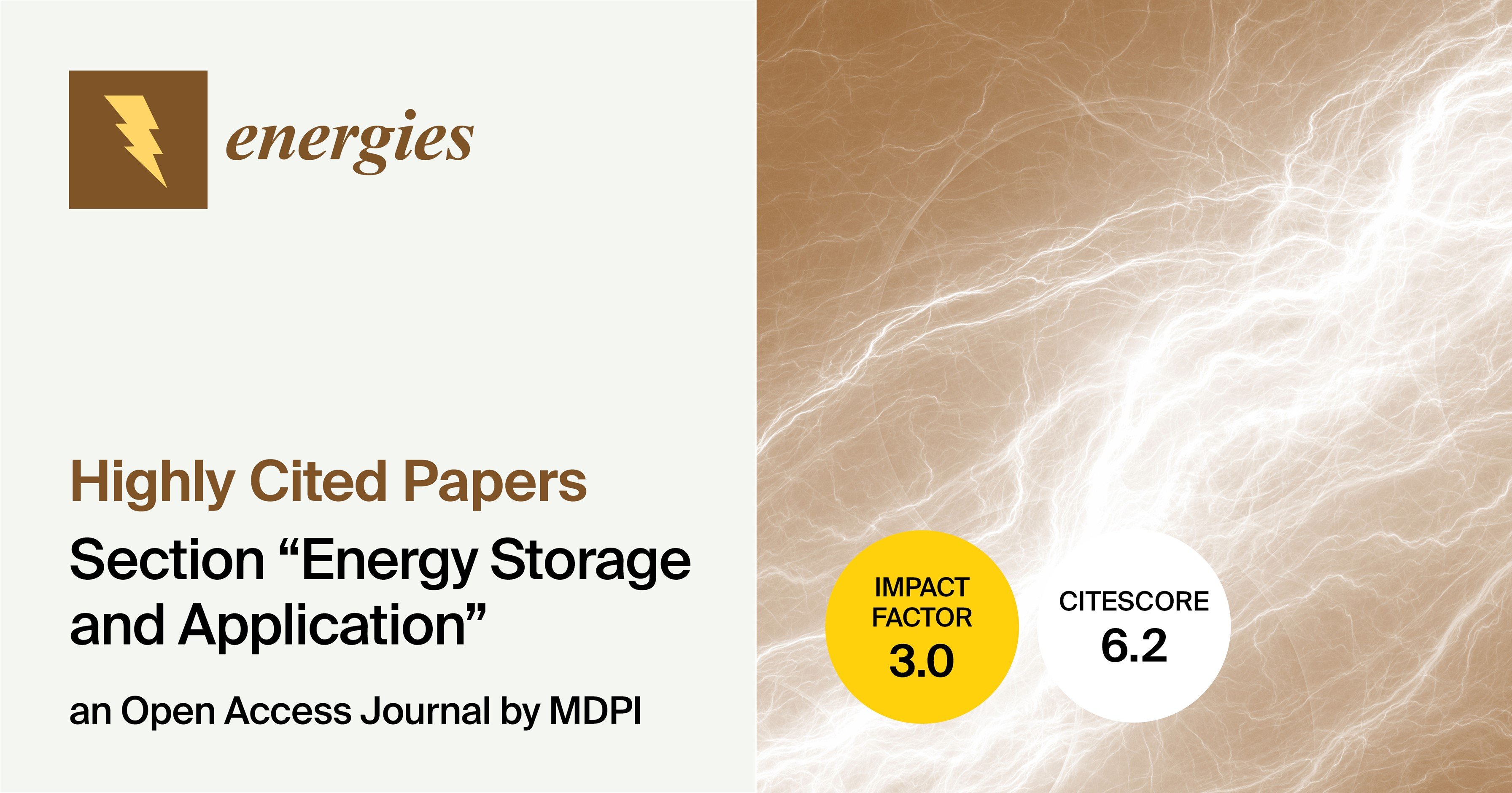
1. “Battery Energy Storage Systems: A Review of Energy Management Systems and Health Metrics”
by Solmaz Nazaralizadeh, Paramarshi Banerjee, Anurag K. Srivastava and Parviz Famouri
Energies 2024, 17(5), 1250; https://doi.org/10.3390/en17051250
Available online: https://www.mdpi.com/1996-1073/17/5/1250
2. “Review of Concentrated Solar Power Technology Applications in Photocatalytic Water Purification and Energy Conversion: Overview, Challenges and Future Directions”
by Cheng Zhang, Na Li and Guangqi An
Energies 2024, 17(2), 463; https://doi.org/10.3390/en17020463
Available online: https://www.mdpi.com/1996-1073/17/2/463
3. “Hybrid Intelligent Control System for Adaptive Microgrid Optimization: Integration of Rule-Based Control and Deep Learning Techniques”
by Osman Akbulut, Muhammed Cavus, Mehmet Cengiz, Adib Allahham, Damian Giaouris and Matthew Forshaw
Energies 2024, 17(10), 2260; https://doi.org/10.3390/en17102260
Available online: https://www.mdpi.com/1996-1073/17/10/2260
4. “Advances in the Study of Techniques to Determine the Lithium-Ion Battery’s State of Charge”
by Xinyue Liu, Yang Gao, Kyamra Marma, Yu Miao and Lin Liu
Energies 2024, 17(7), 1643; https://doi.org/10.3390/en17071643
Available online: https://www.mdpi.com/1996-1073/17/7/1643
5. “Optimizing the Installation of a Centralized Green Hydrogen Production Facility in the Island of Crete, Greece”
by Arif Ahmed, Evangelos E. Pompodakis, Yiannis Katsigiannis and Emmanuel S. Karapidakis
Energies 2024, 17(8), 1924; https://doi.org/10.3390/en17081924
Available online: https://www.mdpi.com/1996-1073/17/8/1924
6. “A Review of the Synthesis of Biopolymer Hydrogel Electrolytes for Improved Electrode–Electrolyte Interfaces in Zinc-Ion Batteries”
by Veerle Vandeginste and Junru Wang
Energies 2024, 17(2), 310; https://doi.org/10.3390/en17020310
Available online: https://www.mdpi.com/1996-1073/17/2/310
7. “Low-Wind-Speed Galloping Wind Energy Harvester Based on a W-Shaped Bluff Body”
by Jianfeng Zheng, Zichang Li and Han Zhang
Energies 2024, 17(4), 958; https://doi.org/10.3390/en17040958
Available online: https://www.mdpi.com/1996-1073/17/4/958
8. “Techno-Economic Planning of a Fully Renewable Energy-Based Autonomous Microgrid with Both Single and Hybrid Energy Storage Systems”
by Mobin Naderi, Diane Palmer, Matthew J. Smith, Erica E. F. Ballantyne, David A. Stone, Martin P. Foster, Daniel T. Gladwin, Amirhossein Khazali, Yazan Al-Wreikat, Andrew Cruden et al.
Energies 2024, 17(7), 1778; https://doi.org/10.3390/en17071778
Available online: https://www.mdpi.com/1996-1073/17/7/1778
9. “Battery Storage Use in the Value Chain of Power Systems”
by Mukovhe Ratshitanga, Ayokunle Ayeleso, Senthil Krishnamurthy, Garrett Rose, Anges Akim Aminou Moussavou and Marco Adonis
Energies 2024, 17(4), 921; https://doi.org/10.3390/en17040921
Available online: https://www.mdpi.com/1996-1073/17/4/921
10. “Shared Energy Storage Capacity Configuration of a Distribution Network System with Multiple Microgrids Based on a Stackelberg Game”
by Binqiao Zhang and Junwei Huang
Energies 2024, 17(13), 3104; https://doi.org/10.3390/en17133104
Available online: https://www.mdpi.com/1996-1073/17/13/3104
12 May 2025
Interview with Dr. Yanbo Wang—Winner of the Energies 2024 Young Investigator Award
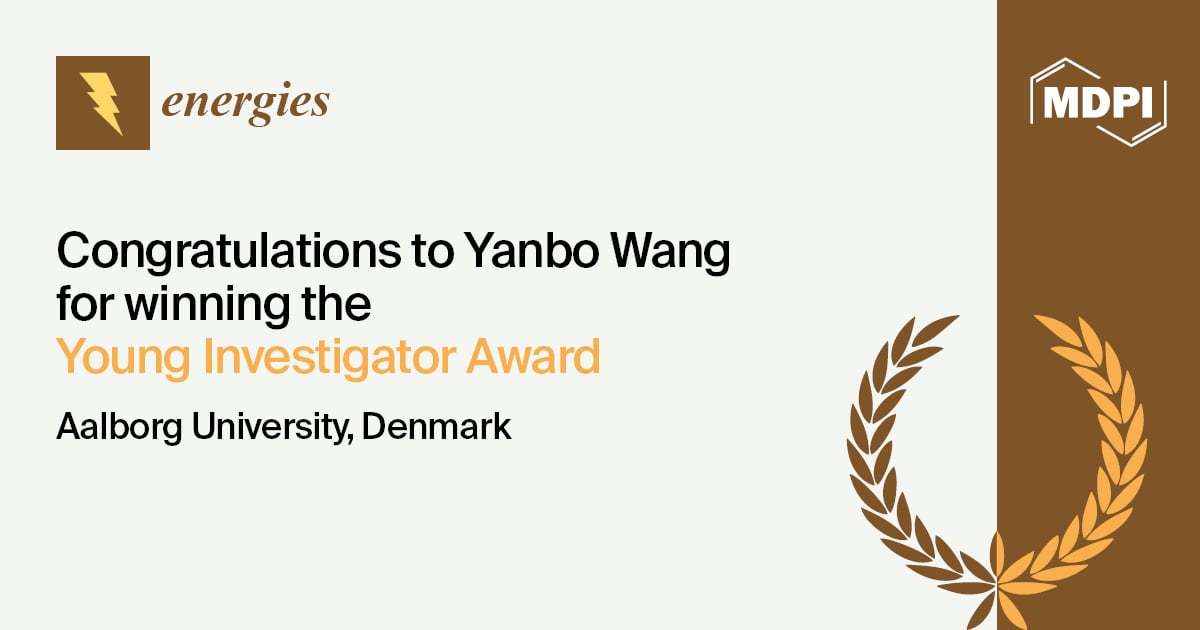
Name: Dr. Yanbo Wang
Affiliation: Department of AAU Energy, Aalborg University, 9000 Aalborg, Denmark
Research interests: integrated energy system; microgrid; wind power system; power to X technology
The Energies Young Investigator Award was established in 2017 to acknowledge the achievements of young investigators in the field of energy. The winner is chosen by the journal’s award committee.
Let us hear his opinions and find out about his experiences in scientific research and awards.
Could you briefly introduce yourself to our readers and tell us a little bit about your fields of interest?
My name is Yanbo Wang, and I am currently an Associate Professor at the Department of Energy Technology at Aalborg University in Denmark. My research focuses primarily on power-electronic-dominated power systems and renewable energy technologies. This includes areas such as microgrids, the modeling and control of power-electronic generators, and integrated energy systems. I am also deeply involved in research on electrified transportation systems. My work aims to support the development of sustainable and intelligent energy infrastructures, and I’m passionate about exploring how different disciplines intersect within the broader field of renewable energy.
Could you elaborate on how you initially learned about the Energies journal? Furthermore, what inspired you to apply for the Energies Young Investigator Award 2024?
I first became involved with the Energies journal through my work as a Guest Editor, where I organized several Special Issues on topics closely related to my research. That role allowed me to collaborate with scholars from around the world and helped me see how valuable the journal is for disseminating new ideas in the field. I’ve also submitted review papers to the journal and benefited from its open and collaborative environment. These experiences inspired me to apply for the Energies Young Investigator Award. I view Energies as not just a publication, but a strong international platform where researchers can share their latest findings and build lasting academic networks.
What is the secret to a happy scientific life? Have you ever encountered any difficulties conducting research and how did you overcome them?
That’s a great question. In science, we constantly face challenges—whether it's in developing new technologies or pushing the boundaries of what we know. I believe the key to a fulfilling scientific life is persistence, curiosity, and a strong belief in the value of your work. I always try to stay confident and ambitious, aiming for original ideas rather than simply following what others have done. When I face difficulties, I return to the fundamentals—conducting basic experiments, running simulations, and most importantly, continuing to learn. I believe it’s essential to have a multidisciplinary perspective. Although my expertise is in renewable energy, I also study related fields like materials science, mechanics, and thermal systems. This broader knowledge base helps me address complex challenges more effectively.
What is your opinion of the open access model of publishing?
I think open access publishing offers an excellent opportunity to share our work with the global research community. At Aalborg University, we have strong collaborations with open access journals like Energies, and I see the benefits clearly. Publishing in open access not only helps others learn from our work, but it also allows us to reflect and summarize our own contributions through review papers. I’ve found it very rewarding—both professionally and intellectually. Open access journals also make it easier to stay updated with the latest developments from peers around the world. It's a powerful model for accelerating the exchange of knowledge.
Do you have any advice for aspiring young researchers looking to make a meaningful impact in their respective fields?
Yes, I do. Renewable energy is a highly dynamic and interdisciplinary field. I encourage young researchers to broaden their horizons and not limit themselves to just one area like electrical engineering. The future of energy systems involves a mix of technologies—hydrogen, thermal systems, mechanical engineering, and more. You need to build knowledge across fields to make real progress. Also, think beyond academia—consider how your research can be applied in real-world engineering contexts. That’s how you ensure your innovations can truly make an impact. I also recommend building strong academic networks through international conferences, collaborative projects, and organizing Special Issues in journals like Energies. That has helped me a lot in establishing meaningful collaborations with top scholars.
As the winner of this award, is there something you would like to express to our readers?
I am truly honored to receive the Energies Young Investigator Award. It’s a major encouragement for me and reinforces my motivation to contribute further to this exciting field. I want to sincerely thank the Energies journal for this recognition—it means a great deal to me in my academic career. I would also like to encourage readers to be bold in exploring innovative technologies. Renewable energy is not just a hot topic—it’s the future. Under the global push for low-carbon development, all countries are seeking green solutions. This creates great opportunities for researchers and professionals alike. Let’s work together to advance green and renewable energy technologies and make meaningful contributions to a sustainable future.





